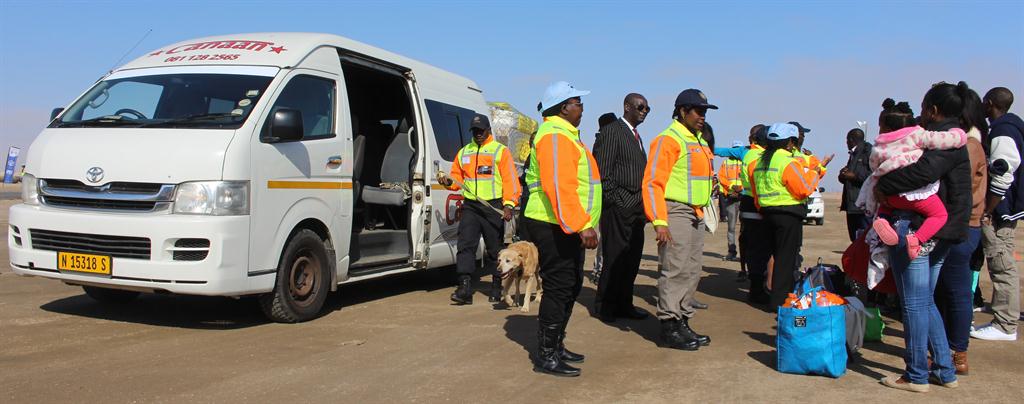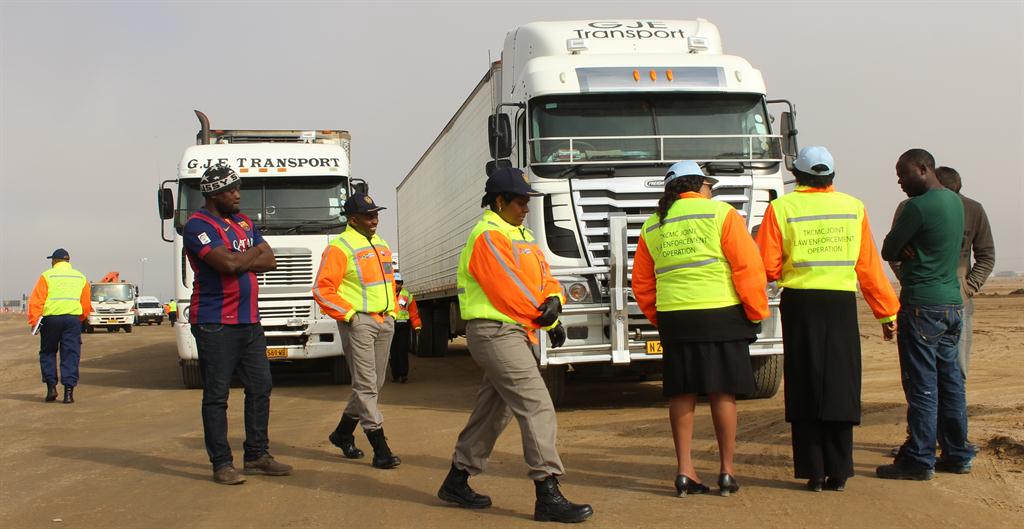Policing the corridors
Namibia, along with South Africa and Botswana have officially started their fourth joint operation to ensure the TransKalahari Corridor remains crime-free.
The deputy works minister James Sankwasa says the optimal utilisation of railway transport could reduce the high rate of road accidents in Namibia.
Sankwasa said most accidents on Namibian roads involve trucks and sedans and that the removal of major cargo from roads will reduce accidents.
“The long distances truck drivers have to cover results in them becoming exhausted and vulnerable. More trade entails increasing the movement of passengers and goods. It is time Namibia looks into the upgrading of its rail network in conjunction with that of its road network. The expansion of the rail network will reduce cargo and people on roads. It also becomes imperative that we look at drinking and driving as well as the roadworthiness of vehicles,” the deputy minister told delegates at the official opening of the fourth three-nation, TransKalahari Corridor (TKC) joint law-enforcement operation held at Swakopmund last week.
Sankwasa also commented that road accident statistics for the three member states leave much to be desired. He pointed out that according to the World Health Organisation (WHO), Namibia is ranked 35 in the world and third in SADC and said the figures for Botswana and South Africa were not any better.
“Without some form of transport, no economic activity can take place and physical connectivity alone is not sufficient in itself. It has to be enhanced by a combination of cross-border software, harmonisation of regulations, procedures and standards, open markets and a globalised perspective, efficient transport logistics and global network. One of the fundamental challenges is how to implement integrated initiatives and make them work.”
He welcomed the fact that the operation was preceded by training on the transportation of dangerous goods and said operators are at times expected to handle vehicles that convey dangerous goods without the necessary know-how.
“Dangerous goods are conveyed on our roads and these roads traverse human settlements, be it cities, towns and villages. It is equally imperative that communities are engaged and educated on such dangerous goods. I am delighted to learn that educational campaigns on dangerous goods were conducted in Witvlei on the 24 July and Usakos recently.”
Sankwasa also recommended that subsequent operations should include government chemical engineers and radioactive specialists in order to help governments understand and detect what is moving in the corridor.
“A lot of chemicals move in our corridors, some of these may even be used to manufacture weapons of mass destruction.”
He further warned that the TKC was not immune to a number of ills such as fraud, submission of fraudulent documentation, cybercrime, smuggling, human trafficking, contraband items, drug trafficking, even trafficking of illegal weapons.
“In fact, already there is evidence of some of this taking place on the TKC. I am reliably informed that during the previous operations, a number of people were arrested who were dealing with drugs as well as human trafficking. Such operations therefore will help to curtail such undesirable tendencies.”
The deputy minister also hailed the TransKalahari Corridor as a very important and strategic corridor for Namibia with the country currently positioning itself to be a regional logistic hub for SADC.
“It is also a holistic strategy for development and well-developed corridors enhance accessibility, reliability and predictability, which are key in the facilitation of trade. A number of infrastructural developments which include the port expansion, the development of the SADC Gateway port and the dual carriageways are in progress. It is therefore imperative that compliance is maintained on the corridor. It is thus also appropriate that the countries in the region act together to compete in a highly integrated global system.”
South Africa's High Commissioner to Namibia Mavivi Maykayaka Manzini called for an increase of TKC joint operations to be hosted based on the agreement signed in 2003 and said the movement of goods and people across borders needs collaboration. South Africa provided experts for training on dealing with dangerous goods during the most recent TKC joint operation in Swakopmund.
“Of the 72 agreements signed with Namibia the TKC secretariat subcommittee which deals with safety, security and defence is very active.”
Botswana's High Commissioner to Namibia Tshenolo Modise thanked involved parties and said the participating countries attach a lot of effort and importance to the joint operations. This signals commitment and dedication, which bears testimony to s smooth operating and successful TKC.
“Harmonising procedures and processes makes lives easier for users of the corridor and workshops ensure highest world-class standards are met.”
OTIS FINCK
Sankwasa said most accidents on Namibian roads involve trucks and sedans and that the removal of major cargo from roads will reduce accidents.
“The long distances truck drivers have to cover results in them becoming exhausted and vulnerable. More trade entails increasing the movement of passengers and goods. It is time Namibia looks into the upgrading of its rail network in conjunction with that of its road network. The expansion of the rail network will reduce cargo and people on roads. It also becomes imperative that we look at drinking and driving as well as the roadworthiness of vehicles,” the deputy minister told delegates at the official opening of the fourth three-nation, TransKalahari Corridor (TKC) joint law-enforcement operation held at Swakopmund last week.
Sankwasa also commented that road accident statistics for the three member states leave much to be desired. He pointed out that according to the World Health Organisation (WHO), Namibia is ranked 35 in the world and third in SADC and said the figures for Botswana and South Africa were not any better.
“Without some form of transport, no economic activity can take place and physical connectivity alone is not sufficient in itself. It has to be enhanced by a combination of cross-border software, harmonisation of regulations, procedures and standards, open markets and a globalised perspective, efficient transport logistics and global network. One of the fundamental challenges is how to implement integrated initiatives and make them work.”
He welcomed the fact that the operation was preceded by training on the transportation of dangerous goods and said operators are at times expected to handle vehicles that convey dangerous goods without the necessary know-how.
“Dangerous goods are conveyed on our roads and these roads traverse human settlements, be it cities, towns and villages. It is equally imperative that communities are engaged and educated on such dangerous goods. I am delighted to learn that educational campaigns on dangerous goods were conducted in Witvlei on the 24 July and Usakos recently.”
Sankwasa also recommended that subsequent operations should include government chemical engineers and radioactive specialists in order to help governments understand and detect what is moving in the corridor.
“A lot of chemicals move in our corridors, some of these may even be used to manufacture weapons of mass destruction.”
He further warned that the TKC was not immune to a number of ills such as fraud, submission of fraudulent documentation, cybercrime, smuggling, human trafficking, contraband items, drug trafficking, even trafficking of illegal weapons.
“In fact, already there is evidence of some of this taking place on the TKC. I am reliably informed that during the previous operations, a number of people were arrested who were dealing with drugs as well as human trafficking. Such operations therefore will help to curtail such undesirable tendencies.”
The deputy minister also hailed the TransKalahari Corridor as a very important and strategic corridor for Namibia with the country currently positioning itself to be a regional logistic hub for SADC.
“It is also a holistic strategy for development and well-developed corridors enhance accessibility, reliability and predictability, which are key in the facilitation of trade. A number of infrastructural developments which include the port expansion, the development of the SADC Gateway port and the dual carriageways are in progress. It is therefore imperative that compliance is maintained on the corridor. It is thus also appropriate that the countries in the region act together to compete in a highly integrated global system.”
South Africa's High Commissioner to Namibia Mavivi Maykayaka Manzini called for an increase of TKC joint operations to be hosted based on the agreement signed in 2003 and said the movement of goods and people across borders needs collaboration. South Africa provided experts for training on dealing with dangerous goods during the most recent TKC joint operation in Swakopmund.
“Of the 72 agreements signed with Namibia the TKC secretariat subcommittee which deals with safety, security and defence is very active.”
Botswana's High Commissioner to Namibia Tshenolo Modise thanked involved parties and said the participating countries attach a lot of effort and importance to the joint operations. This signals commitment and dedication, which bears testimony to s smooth operating and successful TKC.
“Harmonising procedures and processes makes lives easier for users of the corridor and workshops ensure highest world-class standards are met.”
OTIS FINCK






Comments
Namibian Sun
No comments have been left on this article